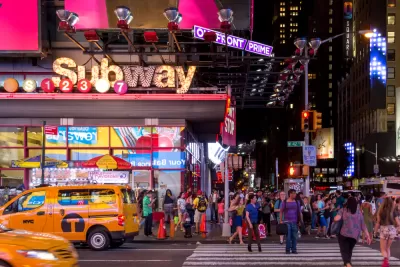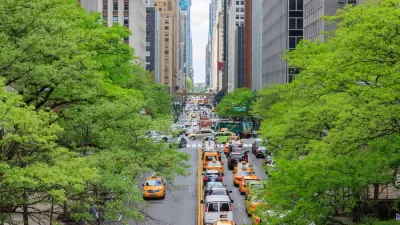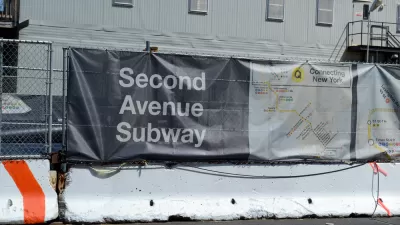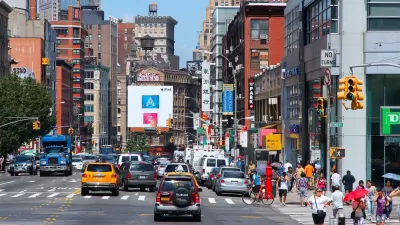In an opinion for City & State, Kathryn Wylde, president of the nonprofit Partnership for New York City, makes the case that the Metropolitan Transportation Authority should be allowed to tax properties where value is enhanced by subway proximity.

As POLITICO New York reported March 21, Gov. Andrew Cuomo is drafting legislation that "would demarcate huge swaths of Manhattan and the Bronx as 'transportation improvement districts,' and allow the state-run Metropolitan Transportation Authority to take property tax revenue from those districts that it claims is generated by transit improvements as far as a mile away" for the purpose of rehabilitating the 665-mile subway system which has fallen into deep disrepair.
Planetizen noted much opposition to the proposal. Deputy Mayor Dean Fuleihan claimed it would wrest "billions" from New York City. The governor's proposal would "usurp the city’s control over its own tax dollars," opined Carol Kellermann, president of the Citizens Budget Commission, for City & State on March 21, as did a New York Post op-ed on March 18.
Kathryn S. Wylde, president and CEO of Partnership for New York City, offers a different perspective on March 22 for City & State.
The rivalry between New York City and state governments has confused the issue and made it seem to some as if this is a cynical money grab, rather than a praiseworthy entrepreneurial initiative by the MTA.
A failure to move this forward would put important projects like New York Penn Station redevelopment, the completion of the Second Avenue subway and new Metro-North stations in the Bronx in jeopardy, since the MTA does not currently have the money for them.
Wylde acknowledges the opposition but believes both sides can work together.
Value capture, as set forward in the executive budget, was interpreted by the city government, the Real Estate Board of New York and others as a money grab for tax revenues that rightfully belong to the city or an unfair supertax on real estate developers who are also contributing to area improvements.
That is easy to fix, and a process that ensures the city is at the table and able to negotiate mutually beneficial terms with the MTA is currently under discussion.
In the end, the case for repairing the subway should motivate city leaders and the Cuomo administration to reach an understanding to use value capture to fund essential public transit improvements, which is in everyone's best interests, she concludes.
FULL STORY: Opinion:MTA’s value capture proposal needs to pass

Planetizen Federal Action Tracker
A weekly monitor of how Trump’s orders and actions are impacting planners and planning in America.

Congressman Proposes Bill to Rename DC Metro “Trump Train”
The Make Autorail Great Again Act would withhold federal funding to the system until the Washington Metropolitan Area Transit Authority (WMATA), rebrands as the Washington Metropolitan Authority for Greater Access (WMAGA).

DARTSpace Platform Streamlines Dallas TOD Application Process
The Dallas transit agency hopes a shorter permitting timeline will boost transit-oriented development around rail stations.

Renters Now Outnumber Homeowners in Over 200 US Suburbs
High housing costs in city centers and the new-found flexibility offered by remote work are pushing more renters to suburban areas.

The Tiny, Adorable $7,000 Car Turning Japan Onto EVs
The single seat Mibot charges from a regular plug as quickly as an iPad, and is about half the price of an average EV.

Supreme Court Ruling in Pipeline Case Guts Federal Environmental Law
The decision limits the scope of a federal law that mandates extensive environmental impact reviews of energy, infrastructure, and transportation projects.
Urban Design for Planners 1: Software Tools
This six-course series explores essential urban design concepts using open source software and equips planners with the tools they need to participate fully in the urban design process.
Planning for Universal Design
Learn the tools for implementing Universal Design in planning regulations.
Municipality of Princeton
Roanoke Valley-Alleghany Regional Commission
City of Mt Shasta
City of Camden Redevelopment Agency
City of Astoria
Transportation Research & Education Center (TREC) at Portland State University
US High Speed Rail Association
City of Camden Redevelopment Agency
Municipality of Princeton (NJ)





























